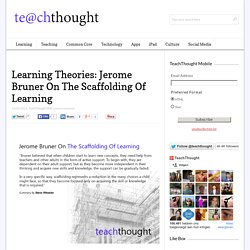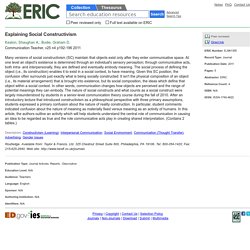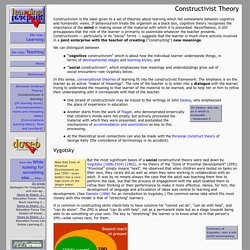

Jerome Bruner On The Scaffolding Of Learning. Education Theory/Constructivism and Social Constructivism - UCD - CTAG. "Constructivism is the philosophical and scientific position that knowledge arises through a process of active construction.

"(Mascolol & Fischer, 2005) "As long as there were people asking each other questions, we have had constructivist classrooms. Constructivism, the study of learning, is about how we all make sense of our world, and that really hasn’t changed. "(Brooks, 1999) Background. Learning Theories: Jerome Bruner On The Scaffolding Of Learning - Learning Theories: Jerome Bruner On The Scaffolding Of Learning by Steve Wheeler, Associate Professor, Plymouth Institute of Education In this post, we explore the work of Jerome Bruner on scaffolding of learning.

This is a simplified interpretation of the theory, so if you wish to learn more, please read the original works. The Theory Bruner’s theory of scaffolding emerged around 1976 as a part of social constructivist theory, and was particularly influenced by the work of Russian psychologist Lev Vygotsky. Bruner believed that when children start to learn new concepts, they need help from teachers and other adults in the form of active support. In a very specific way, scaffolding represents a reduction in the many choices a child might face, so that they become focused only on acquiring the skill or knowledge that is required. How It Can Be Applied To Education It is important for teachers to provide opportunities for children to constantly learn new things. Reference Wood, D. Education Theory/Constructivism and Social Constructivism - UCD - CTAG. Explaining Social Constructivism, Communication Teacher, 2011. Many versions of social constructivism (SC) maintain that objects exist only after they enter communicative space.

At one level an object's existence is determined through an individual's sensory perception; through communicative acts, both intra- and interpersonally, they are defined and eventually embody meaning. The social process of defining the object (i.e., its construction) enables it to exist in a social context, to have meaning. Given this SC position, the confusion often surrounds just exactly what is being socially constructed: It isn't the physical composition of an object (i.e., its material arrangement) that is brought into existence, but its social composition, the ideas which define that object within a social context. In other words, communication changes how objects are perceived and the range of potential meanings they can embody. Routledge. Constructivist Theory in Simple Terms. Some authors divide constructivist theory into two main areas: cognitive constructivism, which focuses on the individual learner, and social constructivism, which emphasizes learning as occurring within the context of dialogue and social interaction.

Cognitive constructivism based on the work of educational psychologists like Piaget, who views knowledge as being created through experience. Knowledge is not transferred from teacher to student in a ready-made format, but actively built by each learner. The internet makes this process much easier than in a non-wired classroom. By using hyperlinks, educators can connect to several resources, scaffolding students’ construction of knowledge. Social Constructivism. Beaumie Kim The University of Georgia Review of Social Constructivism Social Constructivism Vignette Vignette By Roy Jackson, Jessica Karp, Ellen Patrick, Amanda Thrower (2006) Mrs.

Smith is a high school English teacher who has struggled for years when it came to teaching Shakespeare to her students. Instead of reading the play aloud in class, allowing the students to remain passive and uninvolved with the text, Mrs. The class was divided into groups of four. At the first meeting, the group decided it was best to start by reading and discussing Act I together; Nia offered her writing skills to the task of making notes about the progression of the plot and the characters’ actions as the group interacted and constructed meaning out of what they read. Constructivism in learning. Constructivism is the label given to a set of theories about learning which fall somewhere between cognitive and humanistic views.

If behaviourism treats the organism as a black box, cognitive theory recognises the importance of the mind in making sense of the material with which it is presented. Nevertheless, it still presupposes that the role of the learner is primarily to assimilate whatever the teacher presents. Constructivism — particularly in its "social" forms — suggests that the learner is much more actively involved in a joint enterprise with the teacher of creating ("constructing") new meanings.
We can distinguish between. Constructivism (philosophy of education) Use a Learning Theory: Constructivism. 04 Social Constructivism. Vygotsky Social Constructivism. Social Constructivist Theories. For a general intro to constructivism click: Overview of constructivism.

Overview of Social Constructivism Another cognitive psychologist, Lev Vygotsky ( shared many of Piaget's ( assumptions about how children learn, but he placed more emphasis on the social context of learning. Piaget's cognitive theories have been used as the foundation for discovery learning ( models in which the teacher plays a limited role. In Vygotsky's theories both teachers and older or more experienced children play very important roles in learning. There is a great deal of overlap between cognitive constructivism and Vygotsky's social constructivist theory.
Although Vygotsky died at the age of 38 in 1934, most of his publications did not appear in English until after 1960. Constructivism (philosophy of education)